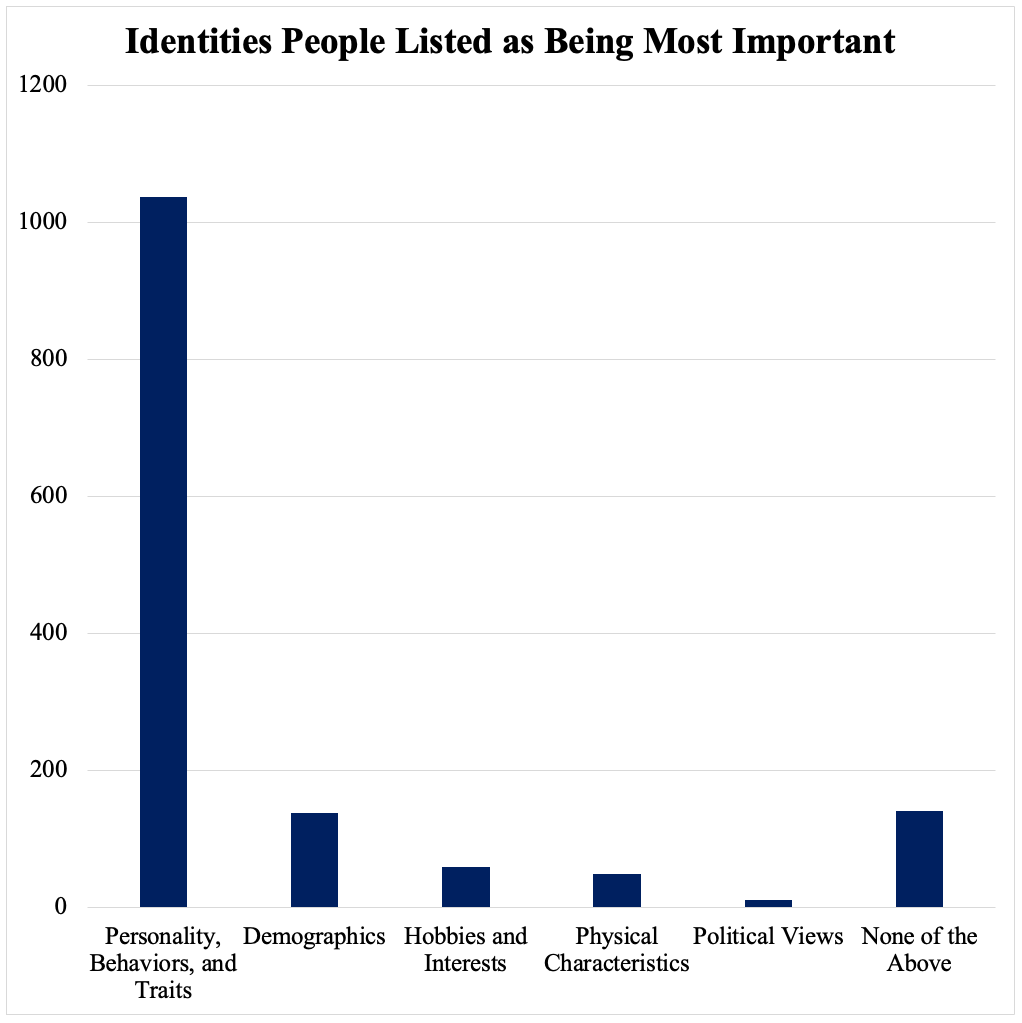People Are More Than Their Politics
Expanding Our Sense Of Self As A Way To Alleviate Affective Polarization
My doctoral dissertation in which I tested and successfully identified 2 ways to reduce animosity between Republicans and Democrats in the U.S.
Methods: 1 original survey and 2 original survey experiments
Data analysis: Content analysis, computational text mining, multivariate regressions (with and without interaction effects)
Technology/Software: R Studio, Qualtrics, Microsoft Excel, GitHub
Full dissertation will be available online soon.
How can we reduce animosity between Republicans and Democrats in the United States?
Problem: Increasing animosity between Republicans and Democrats
Potential Explanation: Americans are hyper-focused on political identities
Potential Solution: People have multiple identities, so we can encourage them to think about those
First thing’s first…
… What other identities are most important to people?
Exploratory Research Question: What identities do people value most in themselves and in their relationship?
Data: 1,432 open-ended responses from 233 respondents (1-10 responses each)
Original open-ended survey administered on Lucid Theorem in July 2023
Methods: Content analysis and computational text mining
Results: People most frequently listed positive characteristics, such as being honest and kind.
Listed a variety of other identities related to personality traits, behaviors, demographics, hobbies & interests, physical characteristics, political views, and others.
Next Steps: Used these identities to inform the design of two survey experiments testing whether encouraging people to think about these attributes in Americans of the opposite political party reduces animosity between them.
Funding: Political Science Department at the University of Illinois Urbana-Champaign


Intervention #1:
Common Identities
Research Question: Can encouraging Americans to think about what they have in common with people of the opposite political party increase desired social contact between them?
Hypothesis: People will be more likely to want to connect with outpartisans when non-political attributes are shared.
Data: 999 participants saw 10 fake social media profiles each, producing 9,990 responses of whether and how likely they they would be to connect with that person. Each profile varied in terms of whether political party was shared with the participant and whether non-political attributes (birth order, occupation, hobby, personality trait) were shared. Participants were American adults who identified as Republicans or Democrats.
Methods: Multivariate regressions clustered on the participant (with and without interaction effects)
Results: People were more likely to want to connect with those with whom they shared more attributes. While shared political party had the greatest effect on people’s desire to connect, people were also more likely to want to connect with people of the opposite political party when non-political attributes were shared.
Funding: Institute for Humane Studies; Department of Political Science at the University of Illinois Urbana-Champaign
People are more likely to want to connect with people with whom they share things in common.
Participants were…
7.8x more likely to want to connect with someone of the same political party
1.8x more likely to want to connect with someone with a shared hobby
1.8x more likely to want to connect with someone working in the same occupation
1.5x more likely to want to connect with someone who was also an introvert or extrovert
1.1x more likely to want to connect with someone who was also an oldest, middle, youngest, or only child
People are more likely to want to connect with people of the opposite political party when they know they share other non-political attributes in common.
Intervention #2:
Positive Characteristics
Research Question: Can encouraging Americans to think about the positive characteristics possessed by members of the opposite political party improve feelings toward them?
Hypothesis: People will feel less negatively toward outpartisans who are described as having positive characteristics.
Data: Vignette experiment administered to 455 university students who identified as Republicans or Democrats. I had a 2x2 design in which I manipulated whether they read about someone of the opposite party and whether that person was described positively. Then participants were asked about their individual- and group-level attitudes toward people of the opposite political party.
Methods: Multivariate regressions (with and without interaction effects)
Results: Reading about an outpartisan with positive characteristics improved attitudes toward that individual but did not change attitudes toward the larger group of the political party.
Individual-Level Attitudes
Participants felt more negatively toward an individual who was a member of the opposite political party.
Participants felt more positively toward an individual who was described positively.
For overall affect, those effects cancelled out when participants read about an individual who was a member of the opposite political party and who was described positively.
For perception of specific traits, participants were more likely to assign positive traits and less likely to assign negative traits to an individual who was a member of the opposite political party and who was described positively.
Group-Level Attitudes
Participants’ attitudes toward voters and politicians of the opposite party in general were not affected by reading about an individual, regardless of how that individual was described







